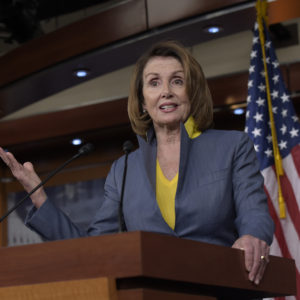Last week, the Senate overwhelmingly passed legislation to bar Chinese companies from listing on U.S. stock exchanges unless they take more aggressive steps to confront rampant fraud and Chinese government control.
The legislation was bi-partisan, sponsored by Sens. John Kennedy (R-La.) and Chris Van Hollen (D-Md.).
This was a step in the right direction, and now Speaker Nancy Pelosi must quickly pass this legislation in the House of Representatives. Simply put, in a post-COVID-19 world, we can no longer turn a blind-eye towards Chinese corruption that risks our health or economic well-being.
Unlike the opaque systems in many third-world countries, robust public disclosure requirements for companies trading on U.S. exchanges build investor confidence by providing financial information that is accurate. This fundamental truth — that our stock markets are honest — are what makes them the most valuable in the world.
But China is the only major country that doesn’t allow a critical U.S. regulator, called the Public Company Accounting Oversight Board, or PCAOB, examine its audits. China’s refusal to comply with global norms allows Chinese companies that are traded on U.S. exchanges to rely on substandard auditing.
This is critical, because Chinese companies professing fake earnings is neither hypothetical nor harmless. In fact, it is a serious matter and you need look no further than the saga of the Chinese company Luckin Coffee and BlackRock, the single largest investment firm on the globe, which is headquartered in New York.
What happened was Luckin Coffee was able to raise billions of dollars from investors, and be traded on the New York Stock Exchange (NYSE), by claiming it was going to be the next Starbucks of China. It created such a sense of hype around that possibility, BlackRock invested $150 million dollars into Luckin Coffee and helped it get listed on the NYSE.
But it turns out that Luckin Coffee was lying about over $300 million dollars in sales and the company’s stock plummeted.
What BlackRock did was especially shocking given that the investment firm is a leading supporter of Wall Street incorporating environmental, social and governance (or ESG) commitments into their investment strategies. In fact, even during the pandemic, BlackRock continues to put pressure on corporate management in its investment portfolio to meet better “governance, environmental and social issues.”
Yet, BlackRock has seemingly ignored their commitment to thoroughly reviewing the governance standards of their investments and the firm has had major investments in at least three China-based companies accused of serious frauds in recent months.
Are we supposed to believe BlackRock had no idea these Chinese companies were not playing straight? Or, is it more likely they look the other way because they don’t want to alienate the Chinese government?
Regardless, if BlackRock — a firm with a purported strong ESG commitment — keeps getting tied to suspicious Chinese companies, something clearly needs to be done.
Thankfully, the bill just passed by the Senate ensures that BlackRock, and, in fact, all Americans investors tempted by the riches of Chinese markets, do not invest in Chinese companies that are publicly traded on U.S. markets which refuse to participate in PCAOB oversight.
Let’s be clear: Trust is the backbone of our economy and it ensures our stock markets work properly. Investors — whether they be middle-class Americans trading a small percentage of their life savings, retirement funds, or huge global investment firms — must have confidence in the integrity of the U.S. exchanges.
Until these Chinese companies lose access to the U.S. capital markets, they aren’t going to play by the rules. While this may be seen as an extreme action, the pandemic is a clear example of what can happen if we fail to address Chinese unwillingness to operate within the parameters of the rule of law.
Therefore, I am urging my former colleagues in the House of Representatives, and Speaker Pelosi, to immediately pass the legislation approved by the Senate to ensure Chinese companies seeking to be traded on the American exchanges are operating honestly.

